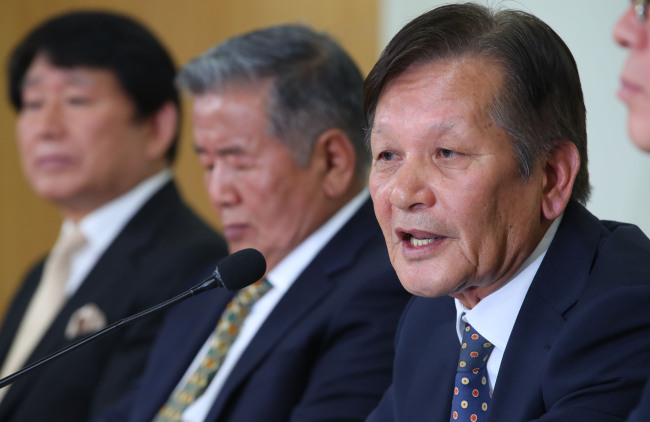Former US military intelligence specialist Kim Yong-chang, one of the four experts dispatched to Gwangju during the May 1980 Gwangju Democratization Movement, on Monday reiterated that former President Chun Doo-hwan was in the city on May 21 -- when soldiers opened fire on unarmed civilians in front of the then-South Jeolla Provincial Government Office.
He also highlighted there was no North Korean involvement in the uprising and undercover soldiers were deployed to Gwangju from Seoul.
Kim was with the US military’s 501st Military Intelligence Brigade in the city during the uprising, and has received awards from the US government in recognition of his services.
His latest testimony comes amid intensifying calls for the government to clarify facts about the Gwangju Uprising. Chun continues to deny the bloody suppression of citizens by the military.
“Chun came (to Gwangju) at around noon on May 21 (1980). He attended a meeting, including then-commander Jung Ho-yong. This is the unchangeable truth. I do not know the conversation they had (in the meeting). A mass shooting took place in front of the South Jeolla Provincial Government Office at around 1 p.m. Based on reasonable assumptions, the order to shoot was given at the meeting,” Kim said in a press conference held at the National Assembly on Monday.
In support of his statement, Kim said it is mandatory under any circumstances for pilots to submit a “flight plan” when departing and landing at a military air base. The records should have been kept by the air force and fire department unless they have been destroyed.
Kim said he filed 40 reports to the US officials, three of which were read by then-US President Carter, adding that the reports included the military’s corpse disposal, helicopter shooting, sexual assaults and takeover of Gwangju Prison.
 |
Ex-US military intelligence specialist Kim Yong-chang speaks about his reports sent to the US government during the May 1980 Democratization Movement in a press conference at the National Assembly on Monday. (Yonhap) |
Heo Jang-hwan, a former investigator with the Gwangju 505 Security Unit during the uprising, said: “I saw the shootings myself. The ‘sit-down shooting’ posture is not for self-defense. Chun had ordered (the soldiers) to shoot (civilians).”
He had testified about the May uprising at a hearing held in Gwangju in 1988.
“I am seeking to put down the cross in my heart. … Any North Korean invasion is misinformation crafted by Chun. This (North Korean invasion) would mean the US intelligence network was exposed. Two US satellites specifically focused on North Korea and Gwangju,” Kim said.
Addressing the narrative that ordinary citizens used violence against soldiers, he said, “There were undercover soldiers. About 30-40 soldiers came to Gwangju from Seongnam Air Base around May 20 (1980). They stayed at the K57 hangar for about two to three days. Upon receiving the tip, I went to the hangar and checked it out myself.”
According to him, the undercover soldiers were in their 20s and 30s, and some of them wore wigs and worn-out clothes.
In late March, Kim testified he reported ex-President Chun’s visit to Gwangju on May 21, 1980, to the US Department of Defense.
His testimony in came amid the slow progress in the fact-finding process of the Gwangju Uprising alongside Chun’s continued denial of ordering the military to open fire on civilians.
Chun is currently on trial on libel charges, accused of defaming late activist priest Cho Chul-hyun, who testified to witnessing the military shooting at civilians from helicopters.
By Kim Bo-gyung (
lisakim425@heraldcorp.com)




![[Today’s K-pop] Blackpink’s Jennie, Lisa invited to Coachella as solo acts](http://res.heraldm.com/phpwas/restmb_idxmake.php?idx=644&simg=/content/image/2024/11/21/20241121050099_0.jpg)



